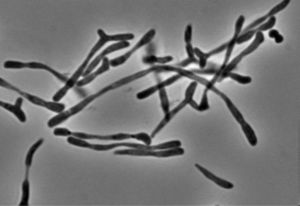Francisco García del Portillo´s research group at the CNB, in collaboration with M. Graciela Puciarelli, from the Universidad Autónoma de Madrid- Centro de Biología Molecular Severo Ochoa (CBMSO-CSIC-UAM) and Fernando Baquero, from Ramón y Cajal Hospital have identified two additional PBPs in the intracellular pathogen Salmonella enterica with high homology to PBP2 and PBP3 (> 65% at the protein level), that they termed PBP2SAL and PBP3SAL, respectively. These new PBPs, which are not expressed in environmental bacteria, behave differently to PBP2 and PBP3. They are only produced in response to intracellular conditions found inside the eukaryotic cell such as acidic pH or limiting amount of nutrients of the phagosome. This fine regulation, dependent on signals from the intracellular environment, means that PBP2SAL and PBP3SAL are not detected in the standard antibiotic susceptibility procedures usually performed by clinicians, in which S. enterica produces PBP2 and PBP3.
Their data, published in EBioMedicine, supports a connection between PBP2SAL and PBP3SAL and the high relapse rate observed in salmonellosis patients treated with third-generation cephalosporins. García del Portillo, principal investigator in the project, explains "our work shows that intracellular localization of the bacteria is not the primary cause of the inability of beta-lactam to eradicate the pathogen, but the production of PBP3SAL replacing PBP3 in the intracellular bacteria ”. "PBP3SAL has low affinity for current beta-lactam antibiotics, explaining why current antibiotic therapy is not sufficient to eradicate salmonellosis, probably leaving many patients carrying bacteria even after the remission of symptoms." This study also demonstrates that PBP3SAL production by the intracellular bacteria is part of the natural program of adaptation of the pathogen to the intracellular life, and not the result of selective pressure imposed by antibiotic treatment.The researchers have used mouse model infections with S. enterica mutants deficient in each of the four PBPs of interest (PBP2, PBP2SAL, PBP3 or PBP3SAL), demonstrating that the absence of PBP3SAL reduces the capacity of the pathogen to cause a relapse after antibiotic therapy. Therefore, the development of new drugs targeting PBP3SAL with high affinity might be required to successfully treat salmonellosis in humans and, most likely, in its other animal hosts.
An alternative penicillin-binding protein involved in Salmonella relapses following ceftriaxone therapy. S. Castanheira, D. López-Escarpa, M.G. Pucciarelli, J.J. Cestero, F. Baquero, F. García-del Portillo
https://doi.org/10.1016/j.ebiom.2020.102771






